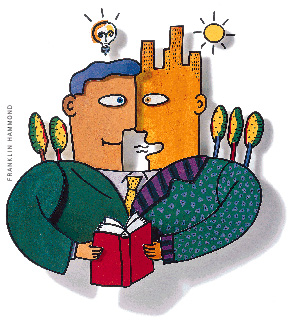
The role of the university defined.
By Judith Rodin
UNIVERSITY campuses are among democracy’s most active laboratories–places where students test theories of governance, both personal and institutional, and where they learn the joys of free expression, as well as the need for careful thought. It is within the university community that students first take on the mature responsibilities of civil discourse and citizenship.
Universities, hence, must take seriously their role as models of community and civic engagement. While they educate future doctors, lawyers, poets and physicists, they also show their students how a society may function through the operation of their campus rules, customs, modes of behavior and discourse.
Last month, in a speech to a leadership colloquium for university presidents co-hosted by the American Council on Education and Campus Compact, I defined three aspects of civic engagement that I believe will be vital to higher education in the century to come. I would like to share them with you.
The first is that of the university as a strong and lively “discourse community” forged from the crucible of intense engagement by its members over issues of personal and public moment. As I see things, we can only create real, solid community by debating–even arguing–with each other over important matters, not by ignoring or suppressing them, especially when we disagree. This principle applies equally to life on campus and to a university’s relations with its external communities.
Led by this conviction, I convened the Penn National Commission on Society, Culture, and Community in 1996–a group of 46 scholars, political leaders and shapers of public opinion–to consider ways to foster a more robust and reasoned public discourse.
The commission’s work has called into question assumptions that “civility” and “mutual respect” are preconditions of productive, deliberative discourse on university campuses or in any other setting. The commission has closely examined communities that create dialogue, engagement and a sense of shared consequences across serious group boundaries. They emerge less often from a controlled, “civil” conversation and more often from the raw, ragged interactions required when people are thrown together with some common task, “with work to do together,” to use historian Tom Bender’s phrase.
What are the common tasks in which university communities must engage? We must form communities of conversation around the most important and compelling issues of the day, whether those be race, affirmative action, immigration and health care, or the stresses and strains of town-gown relations and economic development.
In doing so, we will demonstrate our recognition that we cannot legislate away bad behavior and incivility with codes, policies and regulations, either on campus or in larger society. We will offer our students valid experiences of active, engaged public discourse and civic involvement that will serve them as life-long personal and societal prototypes.
The second form of civic engagement that I identified at the leadership colloquium is the commitment that universities, as citizens themselves, must make to the quality of life in their neighboring communities. In the cities and towns in which their campuses are located, universities bear extensive civic duties, and the manner in which they perform those duties is an example, once again, to their students and to other institutions. The willing participation of universities and their neighbors in the conversations of democracy –which are rarely smooth and rarely easy–is the only way to gain the long-term benefits of mutual trust and understanding.
Several years of these conversations with our West Philadelphia neighbors have helped Penn contribute in major ways to the revitalization of University City. Rather than blunder ahead with a “Penn knows best” attitude, we have listened to our neighbors, considered alternatives and argued various points at length. The result is a shared commitment to secure five broad goals, including: safe and clean neighborhoods; excellent public schools; high-quality, affordable housing; vibrant retail-shopping opportunities; economic development and the creation of new jobs.
Much progress has been made on each of these fronts, and the conversations continue all the while. I believe they must never stop. Comprehensive and sustained community partnerships will help define successful universities in the 21st century, and such partnerships will fail in the absence of a continuous civic dialogue.
A third and final aspect of civic engagement involves our students most directly and is grounded in our core academic mission. As Penn’s founder, Benjamin Franklin, put it: “The great Aim and End of all Learning” is service to society. Franklin recognized that education and research cannot exist in a vacuum and that a university must instill a thorough sense of this in its students.
Penn and other universities have found that one of the best ways to do this is to develop academic “service-learning” courses that find synergy in the combination of scholarship and service. Penn currently has more than 100 such courses that feature a direct and conscious link between public service activities and the academic core of the University.
This year, for example, Penn undergraduates in Anthropology 210 learned about anthropology and biomedical science while, in a service-learning component of the course, they helped local middle-school students, teachers and parents learn more about healthy eating through the development of a for-profit food stand, building a body of practical knowledge for social-service agencies, school districts, hospitals and others to draw upon.
This and other service-learning courses that have evolved at Penn are some of the choicest fruits of the discourse community on our campus–a community in which students and faculty feel free to express social consciousness, political objections, academic aspirations and practical consequences. Ideas for service-learning courses have emerged from this campus community, and they have succeeded and will continue to grow through still more discourse with neighbors in University City.
Free and robust discourse–and a culture of civic engagement–will be hallmarks of great universities in the 21st century. I look forward to their continuous, active presence at Penn.

